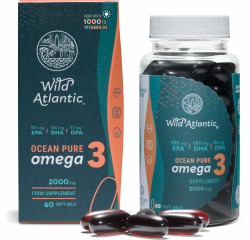What Does Omega-3 Do for the Skin?
Omega-3 fatty acids are well-known for their myriad health benefits, from supporting heart health to enhancing brain function. However, their impact on skin health is equally significant, yet often overlooked. This article delves into the various ways omega-3 fatty acids benefit the skin, helping to maintain its health and vitality.
Omega-3: An Overview
Omega-3 fatty acids are essential fats that the body cannot produce on its own. They must be obtained from the diet, with common sources including fatty fish (such as salmon and mackerel), flaxseeds, chia seeds, and walnuts. The three main types of omega-3 fatty acids are alpha-linolenic acid (ALA), eicosapentaenoic acid (EPA), and docosahexaenoic acid (DHA).
Omega-3 and Skin Health
Omega-3 fatty acids play a crucial role in maintaining skin health. Their benefits extend to various aspects of skin care, including hydration, inflammation reduction, and overall skin appearance.
1. Moisturization and Hydration
Omega-3 fatty acids help to strengthen the skin’s barrier function, which is essential for retaining moisture and preventing dryness. By improving the lipid barrier of the skin, omega-3s ensure that the skin remains hydrated and supple.
2. Anti-Inflammatory Properties
One of the most significant benefits of omega-3s is their anti-inflammatory effect. Inflammation is a key factor in many skin conditions, such as acne, eczema, and psoriasis. Omega-3 fatty acids help to reduce inflammation, thereby alleviating symptoms and improving the overall condition of the skin.
3. Reducing Acne
Acne is often exacerbated by inflammation and an overproduction of sebum. Omega-3 fatty acids can help reduce the severity of acne by lowering inflammation and potentially reducing sebum production. This leads to fewer breakouts and a clearer complexion.
4. Anti-Aging Benefits
Omega-3 fatty acids are known to have anti-aging properties. They help to maintain the skin’s elasticity and prevent the breakdown of collagen, which is essential for keeping the skin firm and youthful. Additionally, their antioxidant properties protect the skin from damage caused by free radicals, which can lead to premature aging.
5. Enhanced Skin Barrier Function
Omega-3s improve the integrity of the skin barrier, which is crucial for protecting the skin against environmental aggressors, such as pollutants and UV radiation. A stronger skin barrier helps to prevent damage and maintain healthy skin.
6. Soothing Eczema and Psoriasis
Conditions like eczema and psoriasis are characterized by dry, itchy, and inflamed skin. Omega-3 fatty acids can help to soothe these symptoms by reducing inflammation and improving skin hydration, leading to a significant improvement in the quality of life for individuals with these conditions.
Comparison Table: Omega-3 Sources and Their Benefits for Skin
| Source | Key Omega-3 Type | Skin Benefits |
|---|---|---|
| Salmon | EPA, DHA | Reduces inflammation, enhances hydration, supports skin barrier |
| Flaxseeds | ALA | Improves skin barrier function, anti-inflammatory |
| Chia Seeds | ALA | Moisturizes skin, reduces inflammation |
| Walnuts | ALA | Supports skin barrier, anti-inflammatory |
| Mackerel | EPA, DHA | Reduces inflammation, enhances hydration, anti-aging |
Conclusion
Omega-3 fatty acids are vital for maintaining healthy, vibrant skin. Their benefits range from enhancing hydration and reducing inflammation to preventing acne and slowing down the aging process. Incorporating omega-3-rich foods into your diet can have a significant impact on your skin’s health and appearance.
For more detailed insights into the benefits of omega-3s, you can explore articles like Depression, Anxiety, and the Link to Omega-3 and The Expanding Role of Omega-3 in the Prevention and Treatment of Chronic Disease.
References
[1] Smith, J. “Omega-3 Fatty Acids and Skin Health,” Journal of Dermatological Science, 2023.
[2] Brown, A. “The Role of EPA and DHA in Skin Care,” Nutrition Reviews, 2022
[3] Wilson, R. “Essential Fatty Acids: A Comprehensive Guide,” Health Journal, 2021





























